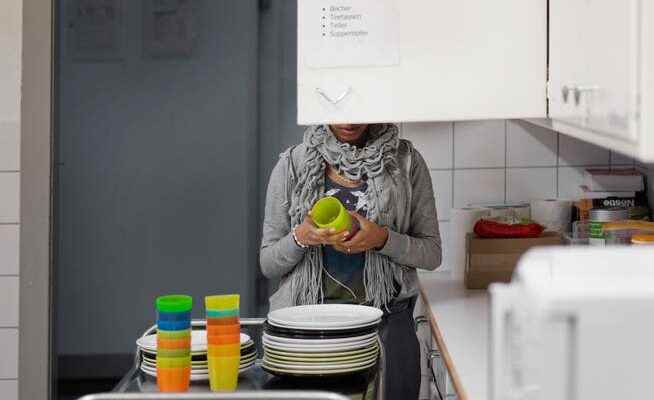Overcrowded and not enough care staff: The Lilienberg center for young people who have fled must now take measures.
90 minors are currently being accommodated in the Lilienberg asylum center. That’s too many, states a test report.
The criticism was harsh. Last June, former employees of the Lilienberg Asylum Center contacted several media and complained that the center was overcrowded and that the care situation was problematic. At that time, around 90 unaccompanied minors were accommodated in the Lilienberg, i.e. young people who fled without their parents.
The criticism had previously been brought to the canton. Although the canton is not directly responsible for looking after the young people, it has given this job to the Zurich Asylum Organization (AOZ). However, the cantonal social welfare office is responsible for supervision. Due to the criticism, the office commissioned an extraordinary tax audit. The report of the Schiess – Advice from Organizations AG is now available.
And the conclusion of the examiners is unequivocal: “The social and educational care situation in the MNA center Lilienberg is worrying.”
Various points are criticized in the report. The center is heavily overcrowded. A maximum of 40 to 45 young people could be accommodated appropriately. The rooms, which are occupied by two to four people, are cramped, and there is little or no space for desks or chairs. There are hardly any retreats for quiet activities such as studying or reading. The whole house is very badly soundproofed, the kitchens are only rudimentary and there aren’t enough sanitary facilities.
Many departures from the staff
Originally, only 45 young people lived in the center. When the number of unaccompanied minors rose sharply last summer, the AOZ accommodated twice as many people in Lilienberg. This is despite the fact that previous supervisory reports had also come to the conclusion that there was not room for 90 residents.
But overcrowding was only part of the problem. After a change in the management of the center in the summer of 2021, several long-standing carers resigned from their jobs at the AOZ. With the result that there were many changes in the caregivers for the young people and from the end of 2021 almost exclusively new employees were employed in Lilienberg. Due to the high fluctuation and the high work pressure in everyday life, the new employees were “not properly trained in the tasks and in the field of activity”, the auditors state.
The supervisors did not take the time for in-depth discussions and arguments and in some cases even avoided them. “A large part of the care work in the Lilienberg MNA center is done in the office,” says the report. As a result, the night’s rest in the center was not observed. In addition, sanitary rooms and kitchens were partly very dirty, as the inspectors found during unannounced visits. The rooms should have been cleaned by the young people according to a set plan, which was obviously not done.
The examiners also sharply criticize the attitude of the AOZ: “The tendency of the AOZ employees, which can be observed again and again, to talk up glitches and errors or to present them as explainable individual cases is worrying.” The criticism from employees was also not received by the management of the AOZ or was not taken seriously enough.
“We made a mistake”
At least today, the leadership admits mistakes. “We should have acted faster,” says AOZ Director Stefan Roschi. Dealing with internal criticism was insufficient. However, the problems went back to a miscalculation that occurred further back: In the contract with the canton, the AOZ guaranteed that 90 people could be accommodated in Lilienberg. It later became clear that the center was too small for this, says Roschi. But last fall, the number of unaccompanied minors exploded. “And we had to accommodate the people somewhere.”
Of course, the support suffered as a result. In addition, the AOZ was unable to implement its care concept for cost reasons. An offer that was too low was submitted to the canton when the contract was tendered in relation to the care concept. “Our concept was good, but not feasible at this price.” The AOZ will now finance the necessary expansion of the care staff from its own resources. “We made a mistake, neither employees nor refugees should suffer from it,” says Roschi.
In addition to increasing the workforce, the report from the AOZ and the canton recommends various improvements. The occupancy rate in Lilienberg should be halved, and sanitary facilities and kitchens should be expanded.
The cantonal social welfare office has now commissioned the AOZ to reduce the occupancy of the center from 90 to a maximum of 60 people. The question arises as to why the canton did not intervene earlier – especially since the supervisory reports from 2019 and 2021 had already stated that the Lilienberg was not suitable for accommodating 90 young people. At the request of the NZZ, the cantonal social welfare office did not comment on Tuesday.
The AOZ is now in the process of setting up two additional residential groups, each of which should accommodate 30 young people in the next few months. In order to create more space in Lilienberg, the lessons that are still taking place on site are to be moved to the upper school in Affoltern am Albis. This means that Lilienberg has enough space for 60 young people, says AOZ director Roschi.
However, Roschi looks to the future with concern, because the number of young people who have fled is increasing. In view of the shortage of skilled workers, it is becoming difficult to find enough caregivers. “The AOZ cannot face this state of emergency alone.” They therefore sought cooperation with the canton, the city of Zurich and other partners.
